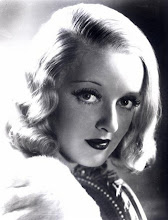When I think of Alfred Hitchcock, the first images that come to my mind are of absolute terror. When digging through a $5 DVD bin at Wal*Mart several months back, I pulled out a boxed set of 20 films from early in the Master of Suspense's career. Admittedly, at this point the only Hitchcock movie I'd ever seen was Notorious, but since I don't happen to live under a rock, I was of course familiar with the famous shower scene from Psycho and the basic plot behind The Birds. This was all I knew of Hitchcock, so naturally I was surprised to see that there was very little actual horror in his earlier works. There are some suspense films in the collection, such as The 39 Steps and The Lady Vanishes, but the movies that most surprised and interested me were the silent romantic comedies. The first of these that I watched was 1928's The Farmer's Wife.
I should start by saying that, although I enjoy silent films, I lack the patience to watch them as closely as they need to be watched. For all my love of classic films, I am a thoroughly modern viewer; I've grown so used to multitasking that I'm almost incapable of sitting down to watch a movie without playing a video game or surfing the internet at the same time. With sound films this isn't much of a problem, because although I may occasionally miss some vital or artistically nuanced action on the screen, I can keep up with the movie's plot simply by listening. Dividing my attention between the TV and my laptop is a lot dicier during a silent film, because all of the information is presented visually. Thus, the first time I watched this film I missed a lot of important parts, such as the farmer's dying first wife reminding Minta, the maid, to hang her master's pants to dry. This seems like a frivolous request to make from one's death bed, but it lets the audience know that the soon-to-be-late wife of the farmer wants him taken care of after she's gone, and that she approves of Minta being the one to do it. This bit of foreshadowing sets up the relationship between Minta and Samuel that doesn't fully develop until the end of the film.
Luckily for me, the film as a whole doesn't rely too much on title cards. Hitchcock lets his actors do the talking, telling the story through actions and emotions rather than words. The audience doesn't need to be told that Samuel is lonely -- we can tell by the way he gazes at the empty chair in front of the fire. Likewise, it's clear from Minta's disapproving expressions, even before the text reveals what she's thinking, that she finds fault with each of the women on his list, perhaps because she herself is not among them. Thirza Topper's vanity, too, is established not by what's said about her but by the sheer amount of time it takes for her to get ready to receive Samuel.
The plot itself is trite but amusing, and I think most audiences would enjoy watching the arrogant Samuel Sweetland rejected again and again. The lack of sound doesn't detract from the clever writing, as Samuel finds new and inventive ways to insult each of the women he proposes to. Overall, it was worth seeing once, but I wouldn't go out of my way to watch it again.
Sources:
Hitchcock, A.(Director). (1930 January 4). ['Movie']. The Farmer's Wife. British International Pictures.
The Farmer's Wife (1928). (2008). IMDb. Retrieved October 25, 2008, from Internet Movie Database Web site: http://www.imdb.com/title/tt0018876/
Subscribe to:
Post Comments (Atom)



No comments:
Post a Comment